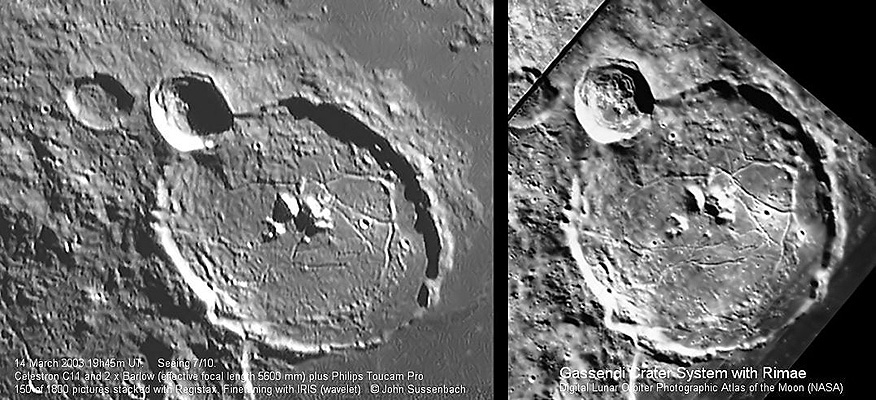Difference between revisions of "January 15, 2004"
| (8 intermediate revisions by the same user not shown) | |||
| Line 1: | Line 1: | ||
__NOTOC__ | __NOTOC__ | ||
=Gassendi Compared= | =Gassendi Compared= | ||
| + | <!-- Start of content --> | ||
<table width="85%" border="0" align="center" cellpadding="6" cellspacing="2"> | <table width="85%" border="0" align="center" cellpadding="6" cellspacing="2"> | ||
<tr> | <tr> | ||
| Line 13: | Line 14: | ||
<table width="100%" border="0" cellpadding="8"> | <table width="100%" border="0" cellpadding="8"> | ||
<tr> | <tr> | ||
| − | <td><div align="center" span class="main_sm">Image Credit: | + | <td><div align="center" span class="main_sm"><p>Image Credit: |
[mailto:john@jsussenbach.nl John Sussenbach] and | [mailto:john@jsussenbach.nl John Sussenbach] and | ||
| − | [http://www.lpi.usra.edu/research/lunar_orbiter/ NASA Lunar Orbiter IV] | + | [http://www.lpi.usra.edu/research/lunar_orbiter/ NASA Lunar Orbiter IV]</p> |
</div></td> | </div></td> | ||
</tr> | </tr> | ||
| Line 26: | Line 27: | ||
astroimager John Sussenbach notes that his image has a resolution of about 0.3 seconds of arc, which is both better than | astroimager John Sussenbach notes that his image has a resolution of about 0.3 seconds of arc, which is both better than | ||
theoretical for an 11" and comparable with the Lunar Orbiter image. Gassendi (diameter 110 km) is another floor-fractured | theoretical for an 11" and comparable with the Lunar Orbiter image. Gassendi (diameter 110 km) is another floor-fractured | ||
| − | crater, like [ | + | crater, like [[January_9,_2004|Posidonius]] and [[January_7,_2004|Petavius]]. The crater |
has been shallowed by floor uplift and lava flooding. | has been shallowed by floor uplift and lava flooding. | ||
</p> | </p> | ||
| Line 34: | Line 35: | ||
[http://www.jsussenbach.nl/ Sussenbach's Digital Astroimaging Using Webcam]<br> | [http://www.jsussenbach.nl/ Sussenbach's Digital Astroimaging Using Webcam]<br> | ||
[http://www.scienceandyou.org/articles/ess_11.shtml Gassendi the scientist]</p> | [http://www.scienceandyou.org/articles/ess_11.shtml Gassendi the scientist]</p> | ||
| − | <p | + | <p><b>Yesterday's LPOD:</b> [[January 14, 2004|First and Last]] </p> |
| + | <p><b>Tomorrow's LPOD:</b> [[January 16, 2004|The End of Lunar Studies]] </p> | ||
</table> | </table> | ||
<!-- start bottom --> | <!-- start bottom --> | ||
| Line 44: | Line 46: | ||
<td><p align="center" class="main_titles"><b>Author & Editor:</b><br> | <td><p align="center" class="main_titles"><b>Author & Editor:</b><br> | ||
[mailto:tychocrater@yahoo.com Charles A. Wood]</p> | [mailto:tychocrater@yahoo.com Charles A. Wood]</p> | ||
| − | < | + | <!-- Cleanup of credits --> |
| − | + | <!-- Cleanup of credits --> | |
| − | < | + | <!-- Cleanup of credits --> |
| − | + | <!-- Cleanup of credits --> | |
| − | < | + | <!-- Cleanup of credits --> |
| − | + | <!-- Cleanup of credits --> | |
| + | <!-- Cleanup of credits --> | ||
</tr> | </tr> | ||
</table> | </table> | ||
| Line 55: | Line 58: | ||
<div align="center"></div> | <div align="center"></div> | ||
<p> </p> | <p> </p> | ||
| − | ---- | + | <!-- End of content --> |
| − | + | {{wiki/ArticleFooter}} | |
| − | |||
Latest revision as of 18:10, 7 February 2015
Gassendi Compared
|
Gassendi Compared The advent of webcams and image compositing and enhancing software has given amateur astronomers with modest size instruments the ability to acquire lunar images that equal or surpass the very best professional images. Now amateurs are pushing up against the resolution of space craft imaging. In this comparison of the lunar crater Gassendi, Dutch astroimager John Sussenbach notes that his image has a resolution of about 0.3 seconds of arc, which is both better than theoretical for an 11" and comparable with the Lunar Orbiter image. Gassendi (diameter 110 km) is another floor-fractured crater, like Posidonius and Petavius. The crater has been shallowed by floor uplift and lava flooding. Technical Details: Related Links: Yesterday's LPOD: First and Last Tomorrow's LPOD: The End of Lunar Studies |
Author & Editor: |
COMMENTS?
Register, Log in, and join in the comments.




